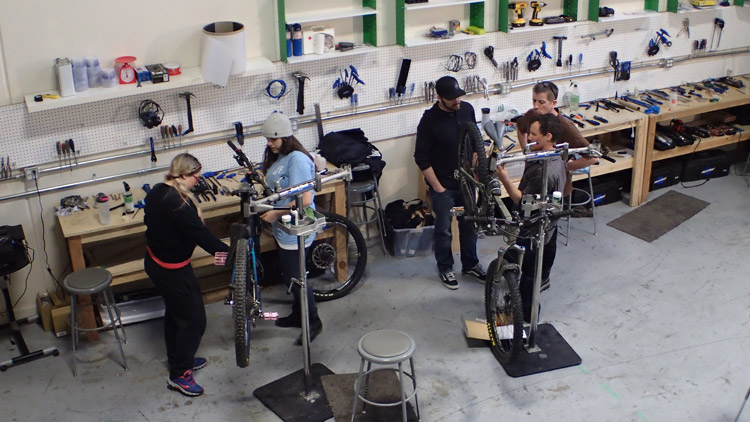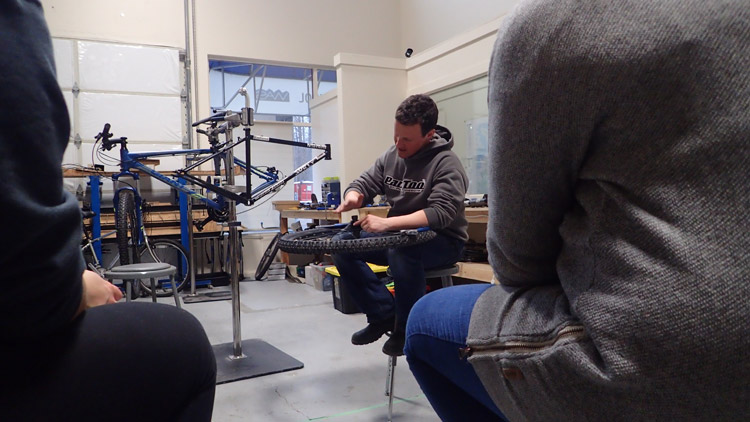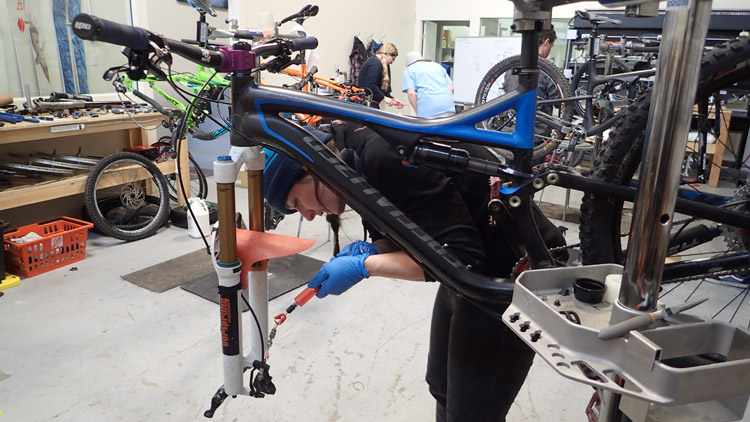Editor’s note: The Bike Fundamentals Course discussed in this blog is no longer an option at the Whistler Adventure School. However, you can take a more in-depth 60-hour Bicycle Mechanic Course if you’re considering a career as a professional bike mechanic.
I’m ashamed to say how many years I’d been riding without knowing how to fix my bike.
Sure, I’ve fixed many a flat tire, been known to repair a snapped chain and have definitely washed the bike and checked the bolts. But living in Whistler with so many excellent bike shops a phone call away, plus a husband who is capable of fixing pretty much everything on two wheels meant I got away without knowing how to do much more for ages. But as my love for riding grew, trail miles increased and one bike magically turned into several (do they breed in storage?) I could no longer count on goodwill of family to see me through a season of multiple tune ups on multiple bikes, even with application of liberal amounts of beer.
So I took matters into my own hands and signed up for the Whistler Adventure School Bike Fundamentals Course. Held a couple of times through spring and summer in their fully decked workshop out in Function Junction, the Bike Fundamentals Course is a solid 15 hours of the stuff you need to know to keep your bike running smoothly. Covering everything from installing drivetrains to bleeding brakes and basic suspension service, the workshops are fully interactive and hands on with full supervision by certified tutors.
I took the course in April, and I’m ready to tube through another amazing bike season on Whistler’s bike trails. Here’s the 7 biggest benefits of taking control of the tools with the Whistler Adventure School:

1. You really get to know your bike
No two bikes are the same and there’s a huge variety of shapes, sizes and components out there. At the Whistler Adventure School (WAS) workshop you work on your own bike, so every task you go through from fixing a flat tire to adjusting brake pads and learning about pre and post ride checks are done on your own machine. As a bonus, the small class size means there’s time to buddy up with another student and check in on their bike too. The better you know your own bike with its unique combination of components, the better you’ll be at diagnosing issues, and knowing how and what you need to fix them. Happy bike = happy trails.
2. You learn the right tools for the job
Not everyone has a complete bike workshop at home, so one of the great takeaways from the course was an understanding of the minimum tool setup needed to do those basic repairs at home. We also got a session on what tools to take when you’re out on the trails to ensure you can make repairs on the go and don’t have to phone home in shame. You also walk out of the class with tools of a different type, being a stack of online resources to help you review each procedure before you try at home, in case memory fails you.
3. You start to appreciate that whole ‘Zen of maintenance’ thing
Bikes are simple, but complex. With a ton of moving parts that get thrown into different riding conditions with differing rider styles, there’s a lot that can go wrong. In a workshop with six different bikes, it was inevitable we’d see a couple of quirks…and we did. Whether it was a sticky axle or a stuck bolt, tutor Steve Reid demonstrated a monk-like ability to breathe and calmly troubleshoot a situation – an excellent example for real life repairs when the simplest things invariably go wrong.

4. You REALLY learn to appreciate your bike mechanic
Will this course give you the skills to fix absolutely everything on your bike? No. Because at the end of the day some things require specialist tools and knowledge and it’s just smarter to let the professionals take over. Luckily in Whistler we have a ton of bike shops staffed by mechanics who can help with those extra-tricky problems. And now you’ll know the kind of things those guys deal with day in, day out (see point 3). Kudos.
5. You’ll have less down time, more trail time
This is one of the biggest benefits. With the course knowledge under your belt, you can really stay on top of things as your hours on the bike rise. With a careful maintenance, early detection of issues and the ability to fix them yourself rather than waiting to get them repaired – you’ll be able to maximise time on the bike and get the most out of riding season.

6. You’ll boost your fun factor
Cleaning a technical climbing section, accelerating out of the perfect corner, dancing through the roots and rocks in the Garbo Zone or simply learning the basics – a well tuned bike will help you ride to the best of your abilities day in, day out – with no distractions or safety issues.
7. You’ll open up new biking adventures
The more you know about fixing your bike, the better equipped you are for longer, more challenging trails. Rides like the new Sproatt Alpine Trail and long alpine descents like the Top of the World Trail don’t just need fitness and skills, they require bikes in top condition, and the tools and smarts to fix stuff if and when it goes wrong. Walk of shame, begone.
Getting educated on my bike is one of the best educational experiences I’ve invested in yet, and I know it’s going to pay off for years to come. And now I get to save my beer budget for the real big repairs and when I need a new bike. Hats off to WAS!
Sign up at the Whistler Adventure School Website and check out their other courses in everything from marketing to manufacturing management and mountain guiding courses. Happy Trails!


